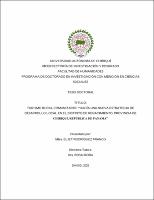Turismo rural comunitario: Hacía una nueva estrategia de desarrollo local en el distrito de renacimiento, Provincia de Chiriquí, República de Panamá.
Resumen
Esta tesis doctoral propone un plan estratégico de desarrollo local, bajo modalidad de “turismo
rural comunitario”, que le permita al distrito de Renacimiento, desarrollarse turísticamente,
aprovechando sus vastos y valiosos recursos naturales, culturales, y humanos; ya que, hasta ahora,
la economía del distrito se ha estado manejando, de forma precaria, mayoritariamente por
actividades agropecuarias, como típica zona rural. Para alcanzar este objetivo, se realiza labor de
observación directa en campo para diagnosticar el área, se utiliza un enfoque cualitativo, porque se
obtiene información teórica que permite recopilar y analizar datos no numéricos para comprender
conceptos, opiniones o experiencias vividas en dichas observaciones en campo; y un enfoque
cuantitativo, por realizar una encuesta que permite obtener información numérica como resultado
de la opinión del ciudadano renacentista constituyéndose así en una investigación mixta. Los
resultados obtenidos por las diferentes técnicas e instrumentos de recolección de datos dan cuenta
de que en Renacimiento ya existe una incipiente actividad turística, sobre todo ofrecida por las
denominadas fincas agroturísticas; y de que su población tiene la voluntad de ser actor directo
como anfitrión del turismo receptivo. Pero para ello, hay que capacitar lideres comunitarios y
concienciar a la población en general en cuanto a turismo y cultura de servicio, señalando al
Municipio de Renacimiento como responsable principal para estas gestiones. Es por eso por lo que
se propone un plan estratégico turístico, consistente en 10 programas básicos, que, bajo la
administración del municipio, pero en armonía con la empresa privada de la zona, los actuales
oferentes turísticos, y su propia gente, logren desarrollar una actividad turística debidamente
planificada, en un horizonte de cinco años, que sirva como plataforma y a partir de allí, sentar bases
del desarrollo turístico sostenible del distrito de Renacimiento. This doctoral thesis proposes a strategic plan for local development, under the modality of
"community rural tourism", which allows the Renacimiento District to develop touristically, taking
advantage of its vast and valuable natural, cultural, and human resources; since, until now, the
economy of the district has been managed, in a precarious way, mainly by agricultural activities,
as a typical rural region. To achieve this objective, direct observation work is carried out in the
field to diagnose the area, a qualitative approach is used, because theoretical information is
obtained that allows non-numerical data to be collected and analyzed to understand concepts,
opinions or experiences lived in said observations in the field; and a quantitative approach, by
carrying out a survey that allows obtaining numerical information as a result of the opinion of the
Renacimiento citizen, thus constituting a mixed investigation. The results obtained by the different
data collection techniques and instruments show that in Renacimiento there is already an incipient
tourist activity, especially offered by the so-called agrotourism farms; and its population has the
will to be a direct actor as a host in a receptive tourism. But for this, it is necessary to train
community leaders and raise awareness among the population in general regarding tourism and
service culture, pointing to the Renacimiento Municipality as the main entity responsible for these
efforts. That is why a strategic tourism plan is proposed, consisting of 10 basic programs, which,
under the administration of the Municipality, but in harmony with the private sector in the region,
the current tourism providers, and their people, manage to develop a duly planned tourist activity,
in a five years horizon, that allows to be a platform, and from there, to lay the foundations for the
sustainable tourist development of the Renacimiento District.

